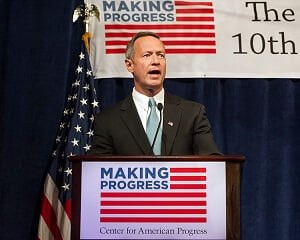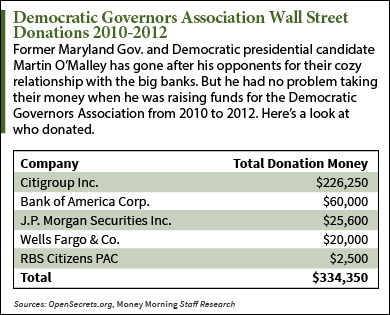 On May 30, 2015, former Maryland governor Martin O'Malley announced his candidacy for the Democratic presidential nomination in 2016.
On May 30, 2015, former Maryland governor Martin O'Malley announced his candidacy for the Democratic presidential nomination in 2016.
The progressive icon stands to the left of the poll-leading Democrat Hillary Clinton and has found a niche in painting himself as the populist hero in contrast to Clinton's Wall Street patronage and far-ranging donor pool of "one-percenters."
And to his credit, his donor list squares up a lot more with a progressive agenda than Clinton's does.
His No. 1 donor between 2005 and 2010, according to OpenSecrets.org, was Venable LLP, with individuals from that law firm contributing $58,490. Venable has been lauded for its corporate philanthropy and sits among a list of O'Malley contributors that includes a smattering of labor unions, university donors, and local Maryland businesses.
That's a lot easier to stomach for the progressive voter than Clinton's donor list, which has Citigroup Inc. (NYSE: C) and Goldman Sachs Group Inc. (NYSE: GS) holding the top two spots, as well as JPMorgan Chase & Co. (NYSE: JPM), Morgan Stanley (NYSE: MS), and Credit Suisse Group (NYSE: CS) all in the top 10.
This has given O'Malley his chance.
He wants voters to watch him send a message to the nation's big financial houses, whose predatory banking practices helped throw the U.S. economy into a financial crisis.
"Tell me how it is, that not a single Wall Street CEO was convicted of a crime related to the 2008 economic meltdown. Not. A. Single. One," O'Malley said in his speech announcing his presidential run.
He was particularly fixated on one Wall Street villain.
"Goldman Sachs is one of the biggest repeat-offending investment banks in America," he said.
And he used that to paint his opponents as puppets for the financial elites.
"Recently, the CEO of Goldman Sachs let his employees know that he'd be just fine with either Bush or Clinton," O'Malley said. "I bet he would."
O'Malley's championing of the middle class against the "Wall Street bullies" would be laudable...if it were believable.
You see, O'Malley can stand by a progressive record as governor of Maryland - legalizing same-sex marriage, repealing the death penalty, signing the state DREAM Act into law - but he can't claim to have come down hard on Wall Street.
Martin O'Malley's Wall Street Ties
 O'Malley is quick to point out Jeb Bush and Clinton's Wall Street ties - and the campaign contributions do bring validity to these criticisms - but he wasn't afraid to take these same banks' money when he was chair of the Democratic Governors Association.
O'Malley is quick to point out Jeb Bush and Clinton's Wall Street ties - and the campaign contributions do bring validity to these criticisms - but he wasn't afraid to take these same banks' money when he was chair of the Democratic Governors Association.
"He obviously didn't have a problem with them when it came to raising money for the Democratic Governors Association," Marta Mossburg, a visiting fellow at the Maryland Public Policy Institute, told Money Morning. "Being chair for two years gave him great access to very large donors, including financial services firms."
From December 2010 to December 2012, under O'Malley's tutelage, the DGA raised $334,350 from a long list of "Wall Street bullies" that includes Citigroup, Bank of America Corp. (NYSE: BAC), JPMorgan, Wells Fargo & Co. (NYSE: WFC), and the Royal Bank of Scotland Group Plc. (NYSE: RBS), according to OpenSecrets.org.
Interestingly enough, Goldman Sachs - the investment bank he highlighted in his speech - was not on that list.
But one name absent from O'Malley's speech was Wells Fargo & Co., which donated $20,000 to the DGA during his chairmanship.
Wells Fargo is a name that should resonate well with the citizens of Baltimore, where O'Malley was mayor from 1999 to 2007.
In 2012 the commercial banking giant had to settle a nationwide $175 million lawsuit on charges that its mortgage lenders engaged in discriminatory lending practices.
Of that settlement, $7.5 million went to settling claims in Baltimore that alleged Wells Fargo gave unfavorable rates to minority borrowers and steered them into subprime home loans.
Wells Fargo admitted no fault. They merely were "settling this matter ... to avoid a long and costly legal fight and to instead devote our resources to continuing to contribute to the country's housing recovery," according to the Baltimore Sun.
[epom key="ddec3ef33420ef7c9964a4695c349764" redirect="" sourceid="" imported="false"]
O'Malley wrote in a Des Moines Register op-ed in March that the United States should "force the banks who break the law to admit their actions and face consequences."
In 2012 he had that opportunity with Wells Fargo.
Instead, when given the bully pulpit - in Baltimore, nonetheless - he chose to point the finger at Goldman Sachs, one of Clinton's biggest donors.
And it begs the question, is he really going to go after Wall Street, or just his opponents' paymasters?
"He didn't shy away from them in raising money," Mossburg said. "Whatever he's saying right now, I'm sure that he will go back to them and try to raise money from the big banks if he's the nominee."
Jim Bach is an Associate Editor at Money Morning. You can follow him on Twitter @JimBach22.
Have Jeb Bush's funding tactics gone too far? He "tested the water" for several months. Is that too long to hold your toe in the ocean? Here are the tactics Bush used to raise his money and how much he allegedly reaped in the process...


